Domestic violence: Push for real change as statistics lay bare extraordinary scale of problem
Police stations on the Gold Coast will be lit up in purple today in recognition of a problem that’s not just swamping the police service, but Australia as a whole.
Police & Courts
Don't miss out on the headlines from Police & Courts. Followed categories will be added to My News.
Today police stations in Southport and Palm Beach will be lit up in purple. It’s to mark the first day of May, which is Domestic and Family violence month.
The symbolism is important. Just as the large turnouts at rallies protesting violence against women on Sunday was also important.
But truth be told, police stations on the Gold Coast are lit up by the issue of domestic violence every single day of the year. Statistics prove it. Statistics that are as shocking as they are stark. The Australian Institute of Criminology (AIC) last week released findings from its National Homicide Monitoring Program. They showed the murder of women by male partners continued to increase.
“In 2022-23, 16 per cent of homicide incidents were intimate partner homicides (IPH) and 89 per cent of these were perpetrated against a female victim aged 18 years or over,” AIC Deputy Director Dr Rick Brown said.
“The findings of the report confirm through state and territory police offence records and coronial records that female IPH increased by 28 per cent, from 0.25 homicides per 100,000 in 2021–22, to 0.32 per 100,000 in 2022–23.”
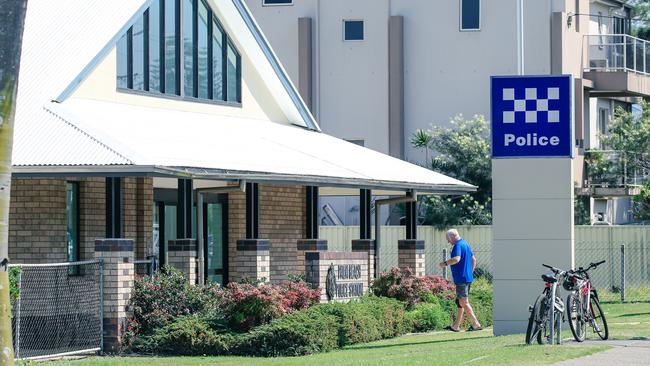
The grim statistics are an outlier. Crime overall on the Gold Coast is not growing at anything like the rate people believe. But domestic violence is a glaring exception.
Another report released last week, this time from the Queensland Government Statisticians office, showed overall crime on the Gold Coast was up 6.2 per cent in the nine years between financial year 2013-14 and financial year 2022-23.
But the rate of sexual offences more than doubled, up by 123.7 per cent. Rape and attempted rape was up by 190.1 per cent. The offence of breaching a domestic violence order was up an extraordinary 341.9 per cent. If police are under the pump, it’s not because of kids stealing cars.
“We’re stretched at the moment. … We are seeing increases in breaches of DV annually for probably at least the last 10 years and the number of Domestic and Family Violence incidents that police attend annually is increasing,” Gold Coast Chief Superintendent Craig Hanlon said on Monday.
Chief Supt Hanlon said perpetrators needed to understand the devastating impact their behaviour had.
“It’s about us getting out there and having those conversations with people, particularly males, and having those hard conversations with males about their conduct. And how their conduct can impact vulnerable people in our community and people they have a relationship with,” he said. “We want all males to treat people fairly and we want everyone to be able to feel safe.
The scourge of domestic and family violence is that unfortunately some people are not safe in their own homes.”
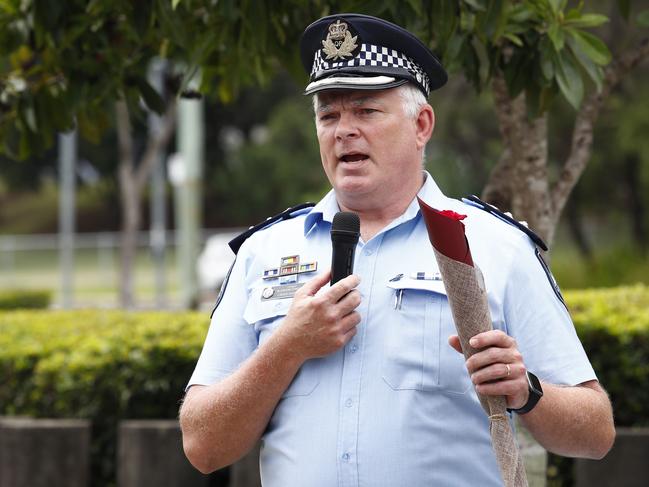
Chief Supt Hanlon encouraged people to attend a candlelit vigil at the Broadwater Parklands at 6pm on Wednesday.
It will be the second event related to the crisis at the Southport Park in just four days. On Sunday, hundreds of people converged there as part of a national rally protesting violence against women.
Among the speakers on Sunday was Melanie Arnost. She said she was heartened by the turn-out on the Gold Coast and around the nation.
“It was so heartening to see. I think for a lot of us we have felt incredibly alone. And no matter how many times we have been trying to talk about the issue the response that I generally have received until these marches has been, ‘we’re doing everything we can’. And I don’t believe that,” she said.
“We can do more. With the number of women dying, as that increases, clearly we need to do more. The data speaks for itself.”
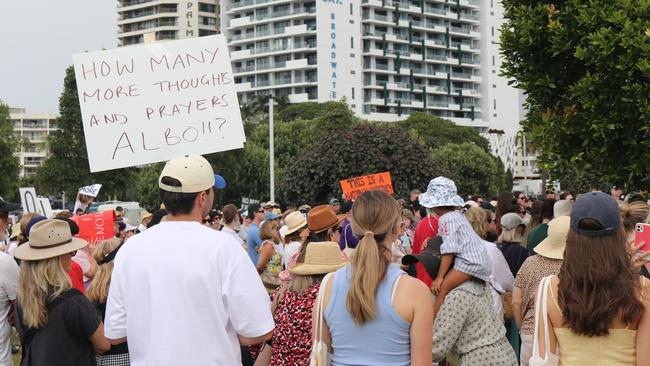
Ms Arnost in November started a change.org petition calling for a national campaign to help break the cycle of violence against women. So far it has been signed by more than 32,000 people.
Although that may seem impressive, she wishes it was more.
“Every time that you see another case in the news you think, when is someone going to say that this is a huge problem? I just cracked one day and I thought, I want all our voices collectively. We’re all talking about it, so if we all start making noise together surely we can be listened to,” she said of why she started the petition.
“I’m heartened to see that as time goes on more and more people see the petition and sign it.
“But I’m also a little sad that we are only up to 32,000 signatures. Other causes get hundreds of thousands. This is people’s lives here. This is not something trivial, this is people’s lives at risk.”
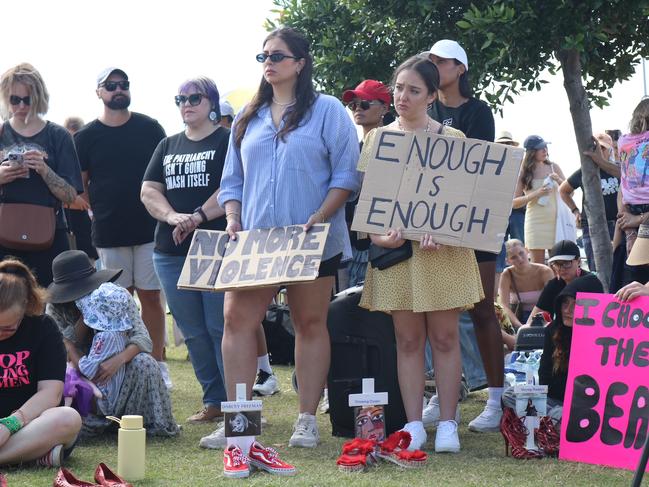
Ms Arnost is calling for a national Royal Commission into the domestic violence crisis, pointing out that a national issue requires a national solution.
It is also a problem, she says, that affects every part of society.
“One of the core things that we need to do as a society is to talk about this in detail. And not dismiss it. Sometimes in our language we say things like, oh they were a couple just having a domestic. It’s so much more dangerous than that, and it’s so much more insidious than that, and it doesn’t happen to a particular kind of person,” she said.
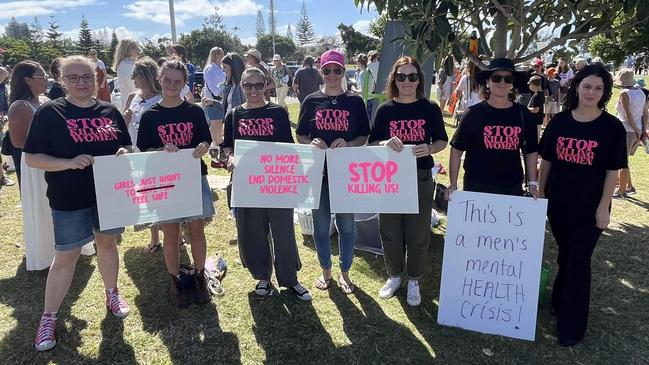
“If you are in a DV courtroom and there is a section for the victims to wait together, the people in there are from every different background, from every different financial status, from every different religion.
“There is no one type of person who is a survivor of domestic violence. It is so pervasive across our society.
“ … My hope is that if we had something national that really exposed to all of us how bad domestic violence was in this country, then maybe we would all get a reality check and say yes, we all agree, no matter what party we are from or what religion we are from, we all want this to change.”
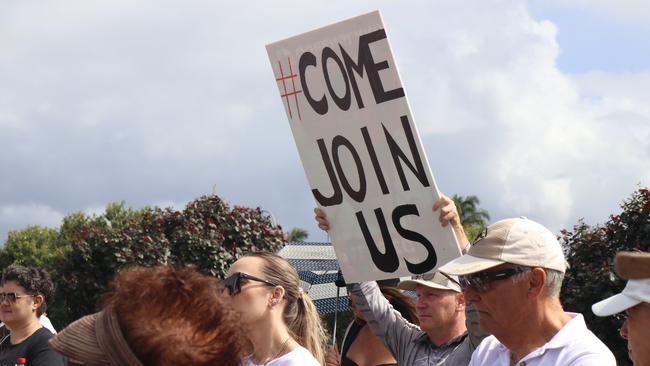
The campaigning work of Ms Arnost and so many others may be close to getting results, with national cabinet meeting on Wednesday to discuss a nationwide response to the domestic violence crisis.
As we move today into Domestic and Family violence month, there will be many words and more events showing solidarity and support. That is, of course, a good thing, and in itself very welcome.
But if there was one message, loud and clear, from the many thousands of women who attended rallies at the weekend it was that words and gestures are not enough.
What they want – what all of us should want and demand – is real action, in every corner of Australia, to properly address this dreadful scourge.




